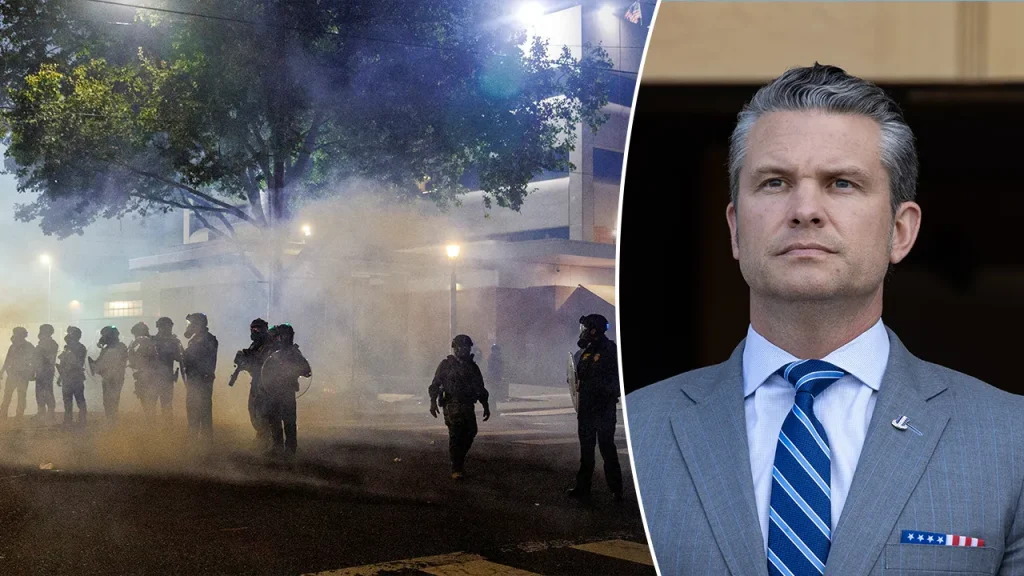Oregon Sues to Block National Guard Deployment to Portland
In a swift legal challenge, Oregon has taken a stand against President Donald Trump’s decision to deploy National Guard troops to Portland. The dispute highlights growing tensions between federal and state authorities over public safety management and the appropriate response to protests in American cities.
Oregon Attorney General Dan Rayfield filed the lawsuit just hours after Governor Tina Kotek received a memo from Department of War Secretary Pete Hegseth authorizing a 60-day deployment of 200 National Guard troops to Portland. The federal order stated these troops would protect federal property “where protests are occurring or likely to occur.” This move prompted immediate pushback from state and local leaders who view it as federal overreach. Governor Kotek, Portland Mayor Keith Wilson, and Attorney General Rayfield—all Democrats—jointly filed the federal court challenge, arguing the administration’s action is both “unlawful” and unnecessary given current conditions in the city. “Oregon communities are stable, and our local officials have been clear: we have the capacity to manage public safety without federal interference,” Rayfield stated, directly contradicting the president’s characterization of the situation.
The conflict intensified after President Trump posted on Truth Social that he had directed Secretary Hegseth to send “all necessary Troops to protect war-ravaged Portland, and any other ICE facilities under siege from attack by Antifa and other domestic terrorists.” This characterization drew sharp criticism from Governor Kotek, who revealed she had spoken directly with the president before the order was issued and had urged against the deployment. Speaking at a news conference at Tom McCall Waterfront Park, Kotek pushed back against Trump’s portrayal, stating, “Our city is a far cry from the war-ravaged community he has posted on social media. There is no insurrection, there is no threat to national security and there is no need for military troops in our major city.” This contrasting assessment of Portland’s situation highlights the fundamental disagreement driving the legal challenge.
Despite these objections, federal agents began arriving in Portland over the weekend, with reports already emerging of a clash outside an Immigration and Customs Enforcement facility. Mayor Wilson condemned the arrival of troops, emphasizing, “We did not ask for them to come. They are here without precedent or purpose.” The deployment has raised concerns about potential escalation, with Senator Jeff Merkley urging demonstrators to avoid confrontations with federal agents, suggesting that creating conflict might be their actual goal. The Oregon lawsuit follows a similar case filed by California in June after the administration sent troops to Los Angeles, indicating a pattern of state resistance to federal deployments in urban areas experiencing protests.
The legal challenge centers on questions of authority, necessity, and the appropriate response to protests. Attorney General Rayfield framed the deployment as divisive and counterproductive, stating, “This will only serve to divide us as a nation and community under the guise of caring about public safety,” and bluntly concluded, “The number of necessary troops is zero.” This position reflects the state’s assertion that local authorities are fully capable of maintaining order without federal intervention. The administration has thus far declined to comment on either the litigation or the deployment, with a Department of War spokesperson telling Fox News Digital, “As standing policy, the Department does not comment on active litigation. We have no comment on this nor the Oregon ARNG deployment at this time.”
The Portland situation raises profound questions about federalism, states’ rights, and the limits of presidential authority in domestic affairs. As federal troops arrive despite local objections, the courts will now be tasked with determining whether this deployment represents a legitimate exercise of federal power to protect government property or an unwarranted intrusion into state and local governance. The outcome could set important precedents for how similar situations are handled in the future, particularly as protests continue to occur across the country. Meanwhile, Portland residents find themselves caught in the middle of a constitutional power struggle that extends far beyond their city limits, with potential implications for federal-state relations nationwide.


